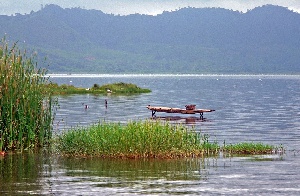Government is to set up a permanent committee to oversee the efficient and sustainable management of the Bosomtwe Lake and its resources - the mainstay of the economies of about 30 communities with a combined population of nearly70,000 people.
This comes amid growing concerns about the depletion of the lake’s fish stock and pollution.
Mr Akwasi Oppong-Fosu, the Minister of Environment, Science, Technology and Innovation (MESTI), said the committee would be made up of representatives of the Traditional Authorities, the District Assembly, Forestry Commission, Water Resources Commission and the Ministry of Fisheries.
He dropped the hint when he visited Abono, one of the communities in its basin, as part of a two-day official tour of the Ashanti Region. Lake Bosomtwe, a natural lake is situated within an ancient meteorite crater and about eight kilometres in diameter is one of the country’s major tourist attraction centres.
Mr Oppong-Fosu said aside its economic importance – is also a significant national heritage. This is why they would go to every length to make sure that it was properly preserved to continue to sustain the livelihood of the people.
He said the committee would work with all key stakeholders in the lake basin to ensure that the right things were done.
Mr Mark Osa Arkong of the Water Research Institute (WRI) of the Council for Scientific and Industrial Research (CSIR), informed the Minister that the United Nations Educational Scientific and Cultural Organisation (UNESCO) was sponsoring a collaborative research into the sustainable management of the lake.
He said the research was prompted by complaints from the local people that “the lake is shrinking and the fish stock, the mainstay of economy of the area, had kept reducing both in size and quantity”.
Mr Arkong said preliminary investigations showed that there was severe pressure on it with various human activities, polluting and affecting aquatic activities. There is therefore the need for urgent action to control the unhelpful activities.
Regional News of Friday, 1 August 2014
Source: GNA

















